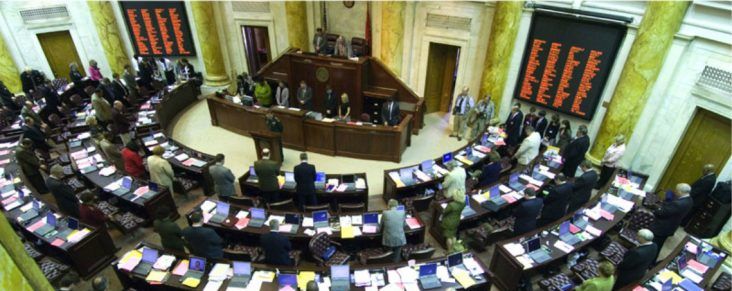End to little-known workers’ comp fund could be special session bill
by May 15, 2016 12:15 pm 324 views

A proposed bill that would do away with the Workers’ Compensation Commission’s Death and Permanent Total Disability Trust Fund has support from some legislators and organized labor but not the Arkansas State Chamber of Commerce, which supports ending the fund, but after more consideration.
Gov. Asa Hutchinson has said he will call the Legislature into special session May 19 to pass a short-term highway funding bill and consider other items that are still being determined. Other items could be considered if included in the governor’s call or if approved by a two-thirds vote of the Legislature.
All non-farm employers – private businesses, nonprofits, and government agencies – with more than three employees must provide worker’s compensation insurance. Among the Workers’ Compensation’s Commission’s responsibilities is the Death and Permanent Total Disability Trust Fund, the last of its kind in the country which provides benefits to employees and their dependents. Funding comes from a 3% tax paid by employers on their workers’ comp premiums, while self-insureds, including many of the state’s largest employers, pay an equivalent.
The fund has a $130 million liability, an amount that is rising, which is why Sen. Greg Standridge, R-Russellville, is proposing legislation that would close the fund Jan. 1, 2017 to new claims while existing claims are slowly paid down over decades. The 3% premium tax would remain. Meanwhile, new claims would be handled by employers and their insurers.
“Every other fund in every other state was going broke, so they turned it back over to the marketplace to let them handle it,” he said.
Standridge said Thursday he has the two-thirds support he needs from the Senate to pass the bill.
“I know we’re getting there,” he said. “Basically, if I know that definitely there’s two-thirds in the House by Monday, it’ll still be a go.”
Randy Zook, Arkansas State Chamber of Commerce president and CEO, said the Chamber has supported ending the trust fund since 2007, but the complicated issue should be considered in the 2017 regular session. The bill makes no provisions for the increasing costs to business, and the Chamber also opposes increasing the premium tax. The Chamber says employers would face unlimited costs for claims, as opposed to the current system where they pay only the first $204,000 per benefit.
“We don’t think it’s the kind of issue that is best considered and decided in a special session with a very short amount of time involved to tend to the issues at hand. … We don’t want to solve part of the problem. We want a comprehensive solution,” he said.
Zook said the Chamber has a “laundry list” of ideas that could “mitigate” the impact on employers. If Standridge’s bill moves forward, that laundry list will be included in a separate bill or in amendments. None of the changes would involve an extra burden on taxpayers, he said, though the Death and Permanent Total Disability Trust Fund is a state responsibility.
It’s hard to tell how much workers’ comp costs will increase if the fund is closed because so much depends on the type of employer. The trucking and timber industries pay more than the Chamber of Commerce office does, Zook said. Estimates of increases are between 3% and 9%, he said. Standridge said that the National Council on Compensation Insurance said rates would increase from 3.6% and 4.6%. However, he said NCCI otherwise had recommended a 2% rate decrease last year and a recommended 4% rate decrease this year.
Alan Hughes, Arkansas AFL-CIO president, said labor supports ending the fund. In the past, so has the Chamber. “Now, the Chamber says, ‘Well, we want something for giving it up.’ Well, hold it. They’re not the ones giving it up. We’re the ones giving it up.”
Standridge expressed frustration with the Chamber’s stance, saying he needs a clean bill to keep labor’s support.
“This thing’s got a 30-year tail on it,” he said. “When I say ‘do away with the fund,’ we’ve got widows, we’ve got children, we’ve got all kinds of people in this fund that we’re going to have to take care of, probably for the next 30 years. … The fund doesn’t have enough premium tax going into it to withstand all the claims.”
House Speaker Jeremy Gillam, R-Judsonia, said Friday in a session with reporters that he has heard “a tremendous amount of support” from members for ending the fund. Whether the fund is included in the session call depends on how urgently the issue needs to be addressed.
Regarding the Chamber’s stance on the issue, Gillam said, “Everybody’s scratching their heads about that, but just because the Chamber’s against it doesn’t mean it’s a bad idea, is kind of what I keep hearing from a lot of members.”
In response, Zook said workers’ comp is a “down in the weeds aspects of creating and maintaining a favorable business climate in Arkansas.” He said the workers’ comp system “is one of the two or three very best and healthiest systems in the country.”
“This is not just us,” he said. “This is the Poultry Federation. This is Wal-Mart. This is Tyson. Many of Arkansas’ leading and largest employers. … Look, this is going to have an impact on some state government budgets because their workers’ comp costs are going to go up. So we’re just saying, look, we all are for solving this issue. We just want to do it in a way that allows full, complete discussion of all of the aspects of the issue.”
